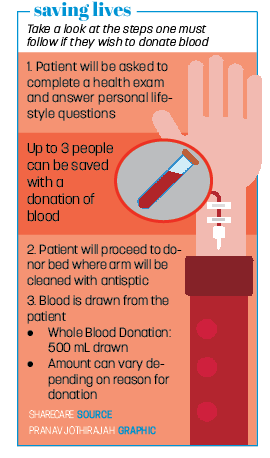The information in this issue—originally scheduled for publication on March 20—was written and produced prior to news regarding school cancellation from the COVID-19 virus. Some information may be outdated or inaccurate as a result.
Student staff members worked hard to produce this content and, despite the circumstances, we still wanted readers to have an opportunity to see it.
Thank you for your readership.
The CHS Senate plans to host its spring blood drive in early April in partnership with the Versiti Blood Center of Indiana. This has been an annual activity and is something they plan on continuing this year. However, with each year, the blood drive gathers less blood.
According to Nina Metaxas, senator and senior, the decreased amount is due to a disconnect between the school and the hospitals.
Metaxas said, “(CHS) has kind of lost the sense of unity and relationship with the blood drive that it had in years past. “Some people’s hearts just aren’t in the right place. Frankly, some people just sign up for the blood drive to get us to stop talking to them or because their friend dared them to. Other people sometimes decide they just don’t want to go. Since no one’s showing them that a patient is waiting for you at the hospital, sometimes they just don’t show up.”
The blood collected from the annual blood drives are donated to local hospitals, including Riley Children’s Hospital. As a result of the decrease in donations, these hospitals are affected.
According to Metaxas, the hospitals plan surgeries around the blood drive as they rely on CHS’s donated blood.

Metaxas said, “We have hospitals that rely and schedule surgeries around our donations. Repeatedly over the years when we don’t get as much blood donated as we say we will, there are people in the hospital that have to wait (for their surgeries). Your donation could go to your classmates’ parents or the person next to you at the grocery store.”
Michelle Foutz, Senate sponsor and social studies teacher, said the problem with the amount of blood collected lies with people following through with their sign-up.
Foutz said, “The amount of people we sign up is not the issue. The problem is getting people to show up. The number of people who sign up is the same as its been in years past. When you know someone who is sick that could receive the blood, you’re more inclined to do it. Also, House members used to be able to get points for giving blood but that’s no longer the case. I think it is imperative that we show them how important it is to give blood.”
According to Foutz, in an effort to increase the amount donated, the senate has tried different things to improve the outcome.
Foutz said, “We’ve pushed the fall blood drive back to allow fall athletes to donate as well as offered incentives like a raffle. Also, (senators) work two weeks of lunches, and do promotion videos.”
Despite their efforts to increase the amount of donated blood, both Metaxas and Foutz said the blood drive faces hesitation with false assumptions on eligibility as well as incorrect accounts of giving blood.
Metaxas said, “I think there’s a big stigma behind donating. If we know one thing about Carmel High School, it is that the kids like to exaggerate. There’s a lot of stereotypes and horror stories that people make up when in reality it is just a very rewarding and helpful (thing) to do that saves people’s lives in the hospitals.”
According to Grace Barney, senator and junior, the mindset of CHS has also changed.
Barney said, “CHS is now focused on academics. Some students simply don’t want to miss class. Also, some think that it is going to hurt really bad when really it is not that bad.”

































![AI in films like "The Brutalist" is convenient, but shouldn’t take priority [opinion]](https://hilite.org/wp-content/uploads/2025/02/catherine-cover-1200x471.jpg)









































![Review: “The Immortal Soul Salvage Yard:” A criminally underrated poetry collection [MUSE]](https://hilite.org/wp-content/uploads/2025/03/71cju6TvqmL._AC_UF10001000_QL80_.jpg)
![Review: "Dog Man" is Unapologetically Chaotic [MUSE]](https://hilite.org/wp-content/uploads/2025/03/dogman-1200x700.jpg)
![Review: "Ne Zha 2": The WeChat family reunion I didn’t know I needed [MUSE]](https://hilite.org/wp-content/uploads/2025/03/unnamed-4.png)
![Review in Print: Maripaz Villar brings a delightfully unique style to the world of WEBTOON [MUSE]](https://hilite.org/wp-content/uploads/2023/12/maripazcover-1200x960.jpg)
![Review: “The Sword of Kaigen” is a masterpiece [MUSE]](https://hilite.org/wp-content/uploads/2023/11/Screenshot-2023-11-26-201051.png)
![Review: Gateron Oil Kings, great linear switches, okay price [MUSE]](https://hilite.org/wp-content/uploads/2023/11/Screenshot-2023-11-26-200553.png)
![Review: “A Haunting in Venice” is a significant improvement from other Agatha Christie adaptations [MUSE]](https://hilite.org/wp-content/uploads/2023/11/e7ee2938a6d422669771bce6d8088521.jpg)
![Review: A Thanksgiving story from elementary school, still just as interesting [MUSE]](https://hilite.org/wp-content/uploads/2023/11/Screenshot-2023-11-26-195514-987x1200.png)
![Review: "When I Fly Towards You", cute, uplifting youth drama [MUSE]](https://hilite.org/wp-content/uploads/2023/09/When-I-Fly-Towards-You-Chinese-drama.png)
![Postcards from Muse: Hawaii Travel Diary [MUSE]](https://hilite.org/wp-content/uploads/2023/09/My-project-1-1200x1200.jpg)
![Review: "Ladybug & Cat Noir: The Movie," departure from original show [MUSE]](https://hilite.org/wp-content/uploads/2023/09/Ladybug__Cat_Noir_-_The_Movie_poster.jpg)
![Review in Print: "Hidden Love" is the cute, uplifting drama everyone needs [MUSE]](https://hilite.org/wp-content/uploads/2023/09/hiddenlovecover-e1693597208225-1030x1200.png)
![Review in Print: "Heartstopper" is the heartwarming queer romance we all need [MUSE]](https://hilite.org/wp-content/uploads/2023/08/museheartstoppercover-1200x654.png)



